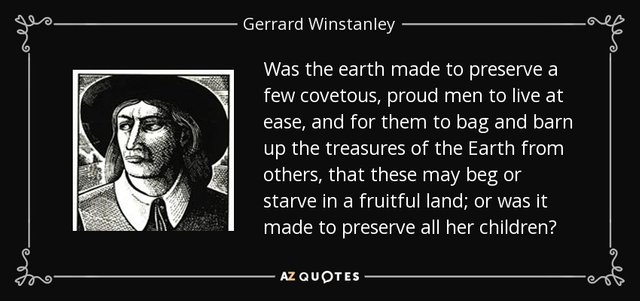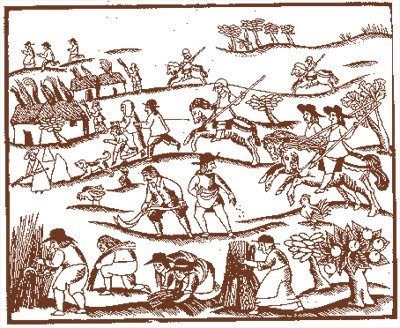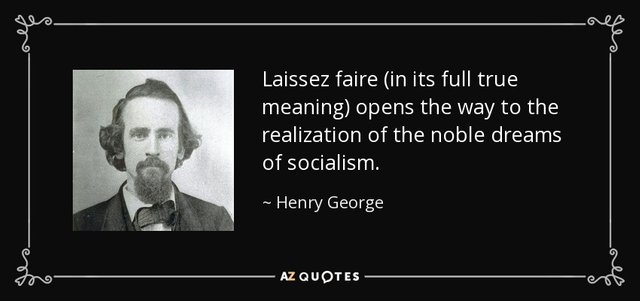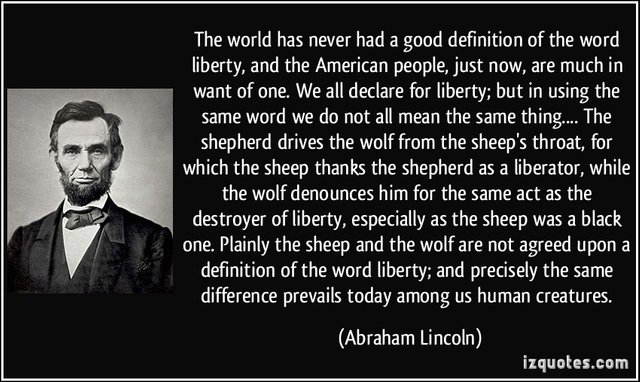Property as Theft: The Libertarian Socialist Critique of Property (Part 2)
In the previous post in this series, I outlined the socialist critique of capitalistic property rights, I explained what Pierre-Joseph Proudhon meant by “Property is theft,” and I touched on the critiques of property in the works of Henry George, Friedrich Engels, and Karl Marx. In this post, I will discuss the previous/primitive accumulation of capital (i.e. how capitalism is historically predicated on theft) and the concept of negative vs. positive liberty.

Karl Marx’s “Primitive Accumulation of Capital” and “Anarchy of Production”
Now we must turn to the primitive accumulation of capital, which Karl Marx addresses in Part 8 of the first volume of Das Kapital. I will remind you that socialists do not define capitalism as a “free market” system. When socialists criticize capitalism, they are criticizing actually existing capitalism rather than some right-libertarian utopia of capitalism the unknown ideal, as Ayn Rand would call it. (We reject Rand’s “capitalism” too, but that is a different matter.) As I pointed out in the preceding post, capitalism is defined by socialists as an economic system in which the means of production are monopolized by a small class of capitalists and the vast majority of the populace consists of proletarians or wage-laborers. Capitalism is the economic system that came about with the Industrial Revolution. As I also noted in the preceding post, a chief characteristic of capitalism is that production is carried about on a collective basis but the profits are appropriated individualistically by the capitalists. Under industrial capitalism, production tends to take place on a large scale, in a centralized fashion, in factories. No longer do we see one individual producing things from materials that he himself owns, as was often the case under medieval mercantilism. Under industrial capitalism, the means of production—land and machinery—are owned by a small group of capitalists, but the vast majority of the populace remains dispossessed and does not own enough land or capital to sustain themselves independently. Consequently, the vast majority of people must sell themselves and their labor to capitalists in order to survive under capitalism.
Capitalistic production presupposes a disparity of wealth. If the vast majority of people must sell themselves and their labor to a privileged minority of capitalists, then it can only be because nearly all land and capital has accumulated into the hands of a small elite class and the rest of the people have become dispossessed and impoverished in the process. The accumulation of capital or concentration of wealth into the hands of the few is not the result of capitalistic production. It can’t be the result of capitalistic production because capitalistic production requires that disparity and accumulation/dispossession as its starting point.
“With this polarisation of the market for commodities, the fundamental conditions of capitalist production are given. The capitalist system presupposes the complete separation of the labourers from all property in the means by which they can realize their labour. As soon as capitalist production is once on its own legs, it not only maintains this separation, but reproduces it on a continually extending scale. The process, therefore, that clears the way for the capitalist system, can be none other than the process which takes away from the labourer the possession of his means of production; a process that transforms, on the one hand, the social means of subsistence and of production into capital, on the other, the immediate producers into wage labourers. The so-called primitive accumulation, therefore, is nothing else than the historical process of divorcing the producer from the means of production….
“And the history of this, their expropriation, is written in the annals of mankind in letters of blood and fire….
“In the history of primitive accumulation, all revolutions are epoch-making that act as levers for the capital class in course of formation; but, above all, those moments when great masses of men are suddenly and forcibly torn from their means of subsistence, and hurled as free and 'unattached' proletarians on the labour-market. The expropriation of the agricultural producer, of the peasant, from the soil, is the basis of the whole process. The history of this expropriation, in different countries, assumes different aspects, and runs through its various phases in different orders of succession, and at different periods.”—Karl Marx (Das Kapital, Volume 1, Ch. 26)
With the Industrial Revolution and the rise of capitalism, we see a shift away from agriculture and craft towards industry and wage-labor. We see a shift away from agrarianism towards industrialism. The rise of capitalism presupposes the expulsion of the agricultural hands from the farms and the thrusting of laborers upon the cities. We see urbanism, industrialism, and capitalism developing in unison. In late mediaeval times, after the collapse of serfdom, a relatively libertarian distributist economy emerged. “The immense majority of the population consisted then…of free peasant proprietors…. the old bailiff, himself a serf, was displaced by the free farmer.”(Das Kapital, Volume 1, Ch. 27) Under this distributist economic system that developed during late medieval times, wage labor did exist. Markets also existed under medieval mercantilism. However, wage labor was not the norm. Marx notes, “The wage labourers of agriculture consisted partly of peasants, who utilised their leisure time by working on the large estates, partly of an independent special class of wage labourers, relatively and absolutely few in numbers. The latter also were practically at the same time peasant farmers, since, besides their wages, they had allotted to them arable land to the extent of 4 or more acres, together with their cottages. Besides they, with the rest of the peasants, enjoyed the usufruct of the common land, which gave pasture to their cattle, furnished them with timber, fire-wood, turf, &c.”(ibid.) There were commons, lands that were communal or public, which anyone could use, so no one was actually dispossessed or deprived of free access to land due to a personal lack of property.

This libertarian distributist arrangement that existed under medieval mercantilism ended with the enclosures, the process of closing off common lands and declaring them to be the private property of elite individuals. The commons were large areas of land that were communally owned. All members of society were allowed free access to the land. The people farmed communally-owned land and shared the produce. Under these distributist/communist arrangements, everyone had access to land, the primary means of production. With the enclosures, the government came and closed off the commons, declaring them to now be the private property of feudal lords. The masses of people who formerly had free access to the land became dispossessed serfs who had to pay rent to the feudal lords in order to gain access to the land. Ownership and access to productive property or land was taken away from the masses and monopolized by a select few. Under these new feudal arrangements, the landlords could charge rent for access to the land, and thereby sustain themselves without having to contribute any productive labor themselves. The enclosures and the abolition of the commons in order to create feudalistic private property in land allowed the landlords to accumulate wealth without contributing anything to society. The lords became a parasitic class. This exploitative arrangement allowed for the primitive accumulation of capital. Thus, private property is historically rooted in theft—the stealing of the commons from the people.
Pierre-Joseph Proudhon and Henry George pointed out the theft involved in private property under capitalism (as I talked about in the previous post in this series). Marx points out that private property originated in an act of theft and that the primitive accumulation of capital upon which capitalistic production is predicated is equally rooted in theft. Without theft and exploitation on a massive scale, capitalism never could have come into existence.
Once the primitive accumulation had taken place, there existed certain capitalists who owned large amounts of land and capital. The capitalists used their large sums of money to produce things to sell. The serfs of old became the proletarians or wage-laborers of the new capitalistic society. The capitalists would own their factories and employ the workers in large numbers. The mode of production became socialistic. No longer were the shoes made by a single shoemaker, a small craftsman. Now production has become a social task. A single shoe is manufactured collectively by a large group of workers in an assembly line. The workers, as a collective, produce the final product. Nevertheless, the capitalists pay the workers meagre wages and appropriate the majority of the wealth produced by the collective labor as private profits. Exchange came to dominate the economy. Prior to the enclosures, society tended towards primitive communism, with limited distributist markets in certain urban areas. With the enclosures, primitive communism was abolished and the primitive accumulation of capital took place. After the accumulation of capital and the consequent inequality or disparity of wealth, the masses were dispossessed and left with no option but to work for the capitalists for wages. Not owning any land or having access to land, they couldn’t survive in isolation. And the capitalists would pay their laborers in monetary wages, and this helped push the development of markets to their full potential. Exchange, money, and markets all existed under primitive communism and the libertarian distributism of medieval mercantilism, but they were not predominant in the economy. It was the development of capitalistic wage-slavery that led to markets and money coming to dominate the economy.
Producers under these new mercantilist conditions had no way of knowing all the relevant facts related to production, distribution, and demand. In supplying any commodity, the producer knows neither how much needs to be produced in order to meet demand nor how much of the same commodity is being produced elsewhere by other producers. There is no economic coordination for production and distribution between the various producers. This was a relatively small problem as long as producers tended to be individuals working in relative isolation. With the new accumulation of capital and shift towards the capitalistic mode of production (i.e. producing things en masse in centralized factories through collective effort), this lack of coordination between various producers led to widespread overproduction and the general disequilibrium of supply and demand that causes economic recessions. This lack of coordination amongst producers is what Marx called the anarchy of production. If the various producers coordinated their actions in a rational way, they could avoid overproduction and the tragedy of the business cycle that is inherent in the capitalistic system. The State, therefore, according to Marx, should renounce its dogma of laissez-faire in the field of economics and intervene in the market by taking over industry and coordinating production and distribution in a rational manner.

Kropotkin’s Critique of Marx’s “Primitive Accumulation” and “Anarchy of Production”
Peter Kropotkin was critical of Marx’s analysis. Marx held that the primitive accumulation of capital resulted from State intervention with the enclosures but that the State under capitalism was basically laissez-faire and allowed the market to exist anarchically. This, however, is not the case at all. Kropotkin observed that the capitalist system was not just predicated on theft for the primitive accumulation of capital, but upon continual and constant State violence. It is the State that suppresses unions, grants monopoly privileges to certain capitalists, and subsidizes corporations with money it stole from the working class.
“We cannot either go on saying, as superficial critics of present society often say when they require the State management of industries, that modern Capitalism has its origin in an ‘anarchy of production’ due to the ‘non-intervention of the State’ and to the Liberal doctrine of ‘let things alone’ (laissez faire, laissez passer). This would amount to saying that the State has practiced this doctrine, while in reality it never has practiced it. We know, on the contrary, that while all Governments have given the capitalists and monopolists full liberty to enrich themselves with the underpaid labour of working men reduced to misery, they have never, nowhere given the working men the liberty of opposing that exploitation. Never has any Government applied the ‘leave things alone’ principle to the exploited masses. It reserved it for the exploiters only.
“In France, even under the terrible ‘revolutionary’ (i.e., Jacobinist) Convention, strikes were treated as a ‘coalition’—as a ‘conspiracy to form a State within the State’—and punished with death….
“In England, working men were hanged for striking, under the pretext of ‘intimidation,’ as late as in 1813; and in 1834 working men were transported to Australia for having dared to found, with Robert Owen, a ‘National Trades’ Union’.
“What, then, is the use of talking, with Marx, about the ‘primitive accumulation’—as if this ‘push’ given to capitalists were a thing of the past? In reality, new monopolies have been granted every year till now by the Parliaments of all nations to railways, tramways, gas, water, and maritime transport companies, schools, institutions, and so on. The State’s ‘push’ is, and has ever been, the first foundation of all great capitalist fortunes.
“In short, nowhere has the system of ‘non-intervention of the State’ ever existed. Everywhere the State has been, and is, the main pillar and the creator, direct and indirect, of Capitalism and its powers over the masses. Nowhere, since States have grown up, have the masses had the freedom of resisting the oppression by capitalists….
“To speak therefore of the non-intervention of the State may be all right for middle-class economists, who try to persuade the workers that their misery is ‘a law of Nature.’ But—how can Socialists use such language? The State has always interfered in the economic life in favour of the capitalist exploiter. It has always granted him protection in robbery, given aid and support for further enrichment. And it could not be otherwise. To do so was one of the functions—the chief mission—of the State.
“The State was established for the precise purpose of imposing the rule of the landowners, the employers of industry, the warrior class, and the clergy upon the peasants on the land and the artisans in the city. And the rich perfectly well know that if the machinery of the State ceases to protect them, their power over the labouring classes would be gone immediately.”—Peter Kropotkin (Direct Struggle Against Capital: A Peter Kropotkin Anthology)
Thus, for Kropotkin, the State cannot be the solution to the problem of capitalism. The State is the weapon of the ruling class. The abolition of capitalism cannot be separated from the abolition of the State. Marx would have us take control of the State in order to abolish capitalism, and then wait for the State to wither away due to obsolescence. Kropotkin would have us smash the State and capitalism in one blow. The State is always the enemy of socialism.
Property Rights Under Capitalism are Statist
The State plays a major role in capitalism by enforcing an arbitrary system of property rights. The system of property under capitalism is not based on occupancy and use, nor is it based on consensus. Under capitalism, the system of property is based on arbitrary “titles” or “deeds” issued by the State. And the enforcement of rules regarding property is done by the State. Thus, capitalistic property rights are inherently statist. A person’s “right” to a piece of land is predicated on the government’s declaration and defense of that “right.” Consequently, capitalistic property “rights” are actually government-granted privilege rather than rights per se. Insofar as socialists oppose private property, they must also oppose the State that upholds and defends the institutions of private property. This is why libertarian socialists insist that anarchism is the only true socialism.

Positive vs. Negative Liberty
There are two different types of liberty. There is positive liberty (liberty for) and there is negative liberty (liberty from). Negative liberty designates freedom from external restraints, while positive liberty designates the capacity to exercise one’s own free will. Suppose that an individual, Mr. X, is held in captivity as a slave to Mr. Y on a small island. It is apparent that Mr. X is not free. Now suppose that Mr. Y releases Mr. X from captivity, so that Mr. X is no longer a slave. Nevertheless, Mr. Y happens to own all the land and produce on the island, so Mr. X has no choice but to continue to work for Mr. Y in order to survive. In this scenario, Mr. X has his negative liberty but he lacks positive liberty. He is legally free from servitude to Mr. Y but actually still in servitude because he lacks viable alternatives to working for Mr. Y.
The man who has negative freedom can say, “I am the slave of no man.” The man who has positive liberty can say, “I am my own master.” The libertarian socialist holds that one must have a large degree of both positive liberty and negative liberty in order to be truly free. Land is a means of production. If I have free access to land, then I can farm or garden in order to produce food for myself. Free access to land means freedom from the necessity of being subjected to the authority of someone else who happens to own the land. If I cannot have free access to the land, then I am less free. Free access to land gives one the capacity to be self-sufficient. If one is deprived of access to the land, then one is forced of necessity to rely on others. If I do not own any land, then I must depend upon someone who does. I will have to be subordinate to the owner of the means of production that is necessary for my sustenance. The serf serves the landlord just as the proletarian serves the capitalist. The landlord and the capitalist are freer than the serf and the wage-worker. Thus, the counter-dictum of Proudhon's "property is theft" is “property is liberty.” Insofar as property is robbery and slavery for one person, it is liberty and prosperity for another. And Proudhon himself was the first to point this out.
If a person is set free from formal slavery but is deprived of access to the means of production, then their liberty is severely restricted. Under capitalism, formal slavery/serfdom has been abolished, but the vast majority of the populace is deprived of ownership of land and capital. Those who happen to own land and capital (landlords/capitalists) are free to collect rent and profit without having to work regularly, while the non-owners (proletarians) are forced to work for the capitalists and pay tribute to the landlords. Thus, capitalism isn’t really libertarian. Capitalism is feudalism repackaged with a milder version of slavery/serfdom, but the vast majority of the populace is still enslaved. The “have nots” are enslaved to the “haves.”
Under capitalism, private property is a system of privilege that grants freedom to the “haves,” while withholding that same freedom from the “have nots.” The “haves” do not have to work for wages in order to survive, while the “have nots” have no option but to engage in wage-labor in order to survive.